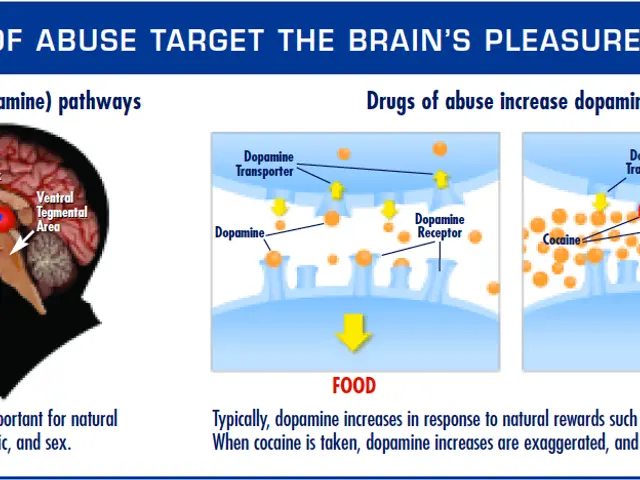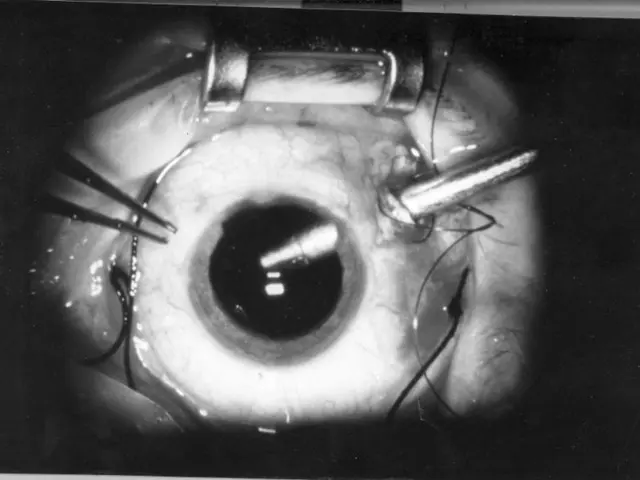Gastroesophageal Reflux Disease: Symptoms, Root Causes, and Therapeutic Interventions
In the United States, a common health issue affecting many individuals is gastroesophageal reflux disease (GERD). This long-term condition occurs when stomach acid flows back up into the esophagus, causing a range of uncomfortable symptoms.
The cause of GERD can be attributed to several factors, both lifestyle-related and demographic. For instance, obesity increases intra-abdominal pressure, promoting gastric reflux. Smoking, alcohol consumption, and poor sleep quality or quantity can exacerbate symptoms by lowering the resting tone of the lower esophageal sphincter, disrupting sphincter function, and acid secretion, respectively. Stress, another contributing factor, increases catecholamine levels, worsening esophageal sphincter action.
As for demographic factors, the prevalence of GERD increases with age, particularly after 40 years. White individuals have a higher incidence of the disease, possibly due to lifestyle factors. Men are more likely to develop pathologic changes of the esophagus, while women may experience more symptoms.
Certain medical conditions also increase the risk of GERD. A hiatal hernia, a condition in which an opening in the diaphragm lets the top of the stomach move up into the chest, weakens the lower esophageal sphincter, facilitating reflux. Pregnancy, by increasing pressure on the stomach, also contributes to GERD symptoms.
When it comes to diagnosis, various tests can be used to determine if an individual has GERD. These may include esophageal pH and impedance monitoring, upper GI endoscope, upper GI series, esophageal manometry, Bravo wireless esophageal pH monitoring, or a referral to a gastroenterologist.
Treatment for GERD may involve a combination of medications and lifestyle changes. Proton pump inhibitors (PPIs) are the most effective medications in treating both erosive and nonerosive GERD and can help heal the lining of the esophagus. H2 blockers, antacids, and prokinetics are other options, but they are less effective than PPIs in healing the esophagus lining.
Lifestyle changes, such as losing weight, sleeping in an inclined position, modifying diet, avoiding food triggers, and avoiding eating meals at least three hours before going to bed, can help improve GERD symptoms. Additionally, adopting habits like eating small meals frequently, avoiding very large meals, staying upright after eating, quitting or avoiding smoking, and minimizing wearing tight clothing around the abdomen can help prevent the onset of GERD.
In severe cases, surgery may be necessary. Fundoplication, a surgical treatment for GERD, involves the surgeon sewing the top of the stomach around the esophagus, adding pressure to the lower end of the esophagus and reducing acid reflux. Endoscopic procedures, such as endoscopic sewing and radiofrequency, are also available to treat GERD and help tighten the sphincter muscle.
If left untreated, GERD can lead to serious complications, including esophagitis, esophageal stricture, Barrett's esophagus, respiratory problems, and even esophageal cancer. It is crucial to manage GERD effectively to prevent these potential health risks.
In conclusion, GERD is a common health issue with various contributing factors. By understanding these factors, individuals can take steps to manage their symptoms and prevent the onset of the disease. If symptoms persist, it is essential to consult a healthcare professional for proper diagnosis and treatment.
- About 50 million Americans suffer from acid reflux disease, commonly known as GERD.
- Lifestyle habits, such as obesity, smoking, and alcohol consumption, contribute to the development of GERD.
- Age, particularly after 40 years, increases the prevalence of GERD.
- White individuals and men are more prone to developing GERD, possibly due to lifestyle factors.
- A hiatal hernia and pregnancy also increase the risk of GERD.
- Diagnosis of GERD can be made through various tests like esophageal pH monitoring, upper GI endoscope, and Bravo wireless esophageal pH monitoring.
- Proton pump inhibitors (PPIs) are the most effective medications in treating GERD, promoting healing of the esophagus lining.
- Lifestyle modifications, such as weight loss and sleeping position changes, can improve GERD symptoms.
- Adopting habits like regular meals, avoiding triggers, and quitting smoking can help prevent GERD.
- Surgery, like fundoplication, may be necessary in severe cases to minimize acid reflux.
- Untreated GERD can lead to serious complications such as esophagitis, esophageal stricture, Barrett's esophagus, respiratory problems, and even esophageal cancer.
- Effective management of GERD can help prevent potential health risks.
- Thus, understanding the contributing factors of GERD can empower individuals to manage their symptoms and consult healthcare professionals when necessary.
- Besides GERD, other chronic diseases like diabetes, COPD, and mental health conditions also require attention in the realm of workplace wellness and medical-conditions management.
- Science continues to explore the benefits of fitness-and-exercise, nutrition, and therapies-and-treatments for eye-health, heartburn, depression, and skin-conditions, among other chronic diseases and health-and-wellness issues.





